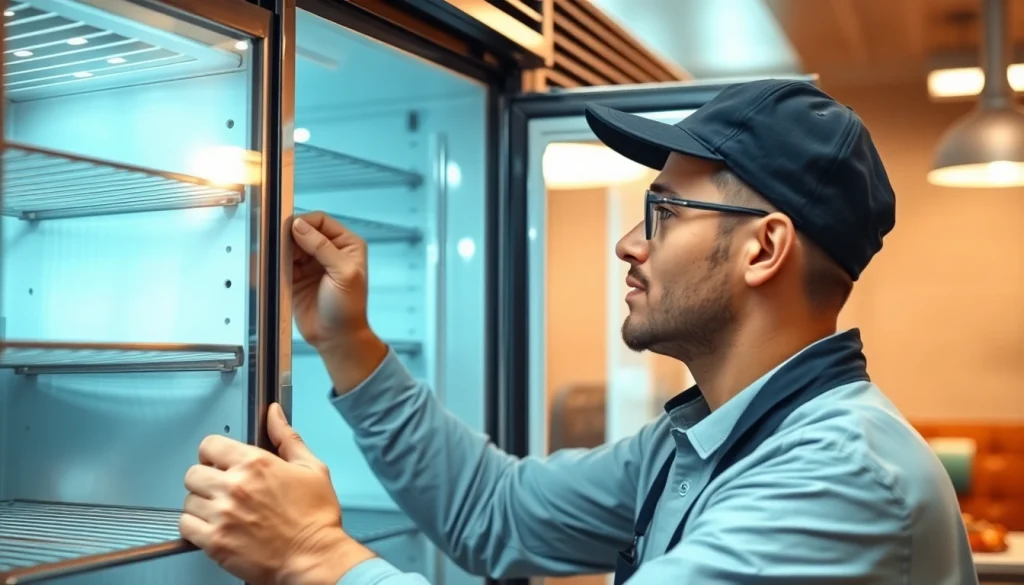Understanding Commercial Refrigerator Repair
What is Commercial Refrigerator Repair?
Commercial refrigerator repair refers to the specialized service of diagnosing and fixing faults in refrigeration systems used in commercial settings. Unlike residential refrigerators, commercial units are often larger, more complex, and essential for business operations in sectors such as restaurants, grocery stores, and warehouses. These systems maintain specific temperature ranges to ensure food safety and product quality. Understanding the intricacies of commercial refrigerator repair goes beyond just fixing breakdowns; it involves preventative maintenance, troubleshooting common issues, and ensuring compliance with health regulations.
Common Issues in Commercial Refrigerators
Common issues that commercial refrigerators encounter include:
- Compressor Problems: The compressor is the heart of the refrigeration cycle, and when it malfunctions, the entire unit may fail to cool. Symptoms include unusual noises or overheating.
- Thermostat Malfunctions: If the thermostat does not function correctly, it can lead to temperature fluctuations that might spoil products.
- Condenser Coils Blockage: Dust and debris can accumulate on condenser coils, reducing efficiency and increasing energy costs.
- Leaking Refrigerant: A refrigerant leak can compromise the cooling efficiency and lead to environmental concerns.
- Door Seal Issues: Worn-out seals can affect the refrigerator’s ability to maintain temperature by allowing cold air to escape.
Importance of Timely Repairs
Timely repairs are crucial for commercial refrigerators, impacting not just operational efficiency but also customer satisfaction and compliance with health codes. Delaying repairs can lead to:
- Increased Energy Costs: Malfunctioning units can consume more energy, leading to higher utility bills.
- Product Loss: Temperature fluctuations can result in spoiled inventory, incurring financial losses for businesses.
- Health Risks: Improperly maintained refrigeration can expose customers to foodborne illnesses.
- Extended Downtime: The longer a refrigerator is out of service, the greater the disruption to business operations.
Signs Your Commercial Refrigerator Needs Repair
Unusual Noises and Performance Issues
Pay attention to your refrigerator’s performance. Noises such as buzzing, clicking, or grinding often signal mechanical issues. These sounds may indicate problems with the compressor, fans, or other internal components. Additionally, if the refrigerator’s performance hesitates—such as inconsistent cooling—this can signal deeper issues that need addressing immediately.
Temperature Fluctuations
Temperature fluctuations can be a red flag for insufficient cooling or heating issues. Maintaining a constant temperature is essential for preserving food quality; thus, you should regularly monitor the temperature with reliable thermometers. If you notice variations beyond the safe range—usually between 32°F to 40°F (0°C to 4°C) for refrigeration—quick intervention is necessary.
Condensation or Ice Build-Up
Excess condensation or ice build-up inside the refrigerator can be indicative of problems with air circulation or humidity control. This may result from blocked vents, faulty evaporators, or malfunctioning fans. If you’re noticing significant ice accumulation or frequent condensation pooling, it’s time to contact a professional for evaluation and repair.
Choosing the Right Commercial Refrigerator Repair Service
Qualifications and Experience
When seeking a refrigerator repair service, don’t overlook the qualifications and experience of technicians. They should be certified and trained to handle various makes and models of appliances, which is vital for troubleshooting complex refrigeration systems. Look for companies that offer strong warranties and certifications to ensure quality service.
Emergency Repair Services
Choosing a service that provides emergency repairs can save you from potentially costly downtime. Many reputable companies offer 24/7 support, so you can have peace of mind knowing that help is available at any hour. When evaluating potential repair services, inquire about their response times and their ability to manage urgent issues effectively.
Customer Reviews and Feedback
Customer reviews can be invaluable in gauging the reliability and efficiency of a repair service. Websites such as Yelp, Google Reviews, or specialized industry sites offer insight into the experiences of other businesses with potential service providers. Look for reviews detailing specific issues and how the company handled them, which can help steer your decision.
Maintenance Tips for Commercial Refrigerators
Regular Cleaning and Care
Keeping your commercial refrigerator clean is crucial for optimal performance. This includes both the interior and exterior of the unit. Regularly remove food residues, spills, and any debris from around coils and vents. Having a consistent cleaning schedule helps maintain hygiene, improves efficiency, and extends the lifespan of your equipment.
Checking for Common Issues
Routine checks can go a long way in preventing unforeseen breakdowns. This includes regularly examining the thermostat settings, inspecting for leaks, and ensuring the door seals are intact. Consider implementing a maintenance checklist that employees can follow to report any unusual occurrences promptly.
Scheduling Professional Maintenance
Investing in professional maintenance services at regular intervals ensures your refrigerator operates optimally. Professionals can conduct thorough inspections, cleanilng, and repairs that may go unnoticed during regular checks. Establish a recurring service contract with reputable technicians to ensure your equipment is consistently maintained.
Cost Factors in Commercial Refrigerator Repair
Averaging Repair Costs
The costs of commercial refrigerator repair can vary widely based on various factors, including the type of service required, the make and model of the unit, and local labor costs. Generally, simple fixes like replacing a thermostat or cleaning coils can cost a few hundred dollars, while more complex repairs can lead to bills exceeding a thousand dollars. It’s essential to get estimates from multiple providers to get a clear understanding of the market rates.
Service Fees and Diagnostics
Most repair services charge a diagnostic fee to evaluate the problem, which typically ranges from $50 to $150. Moreover, service calls also incur a fee, generally falling between $100 and $200. Clear communication regarding these fees before service initiation is crucial to avoid unexpected costs.
Investing in Preventive Maintenance
Ultimately, investing in preventive maintenance can save you money in the long run by reducing the likelihood of emergency repairs. Regular maintenance can help extend the life of your equipment, ensure efficiency, and protect your product quality. Many providers offer maintenance contracts that include periodic inspections and emergency discounts—definitely worth considering.


